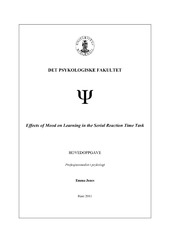Effects of Mood on Learning in the Serial Reaction Time Task
Master thesis
Permanent lenke
https://hdl.handle.net/1956/5898Utgivelsesdato
2011-11-23Metadata
Vis full innførselSamlinger
- Faculty of Psychology [527]
Sammendrag
After a brief overview of existing research on the relationship between mood and implicit learning, some methodological concerns are addressed and an empirical study is reported. Participants (N = 80) were trained on a serial reaction time (SRT) task. Mood was induced by the target stimuli being pictures of human faces expressing happiness (positive mood condition) or sadness (negative mood condition). Response stimulus interval (RSI) was 0 or 500 ms, traditionally associated with implicit and explicit learning, respectively. Results showed a significant interaction between mood and RSI on the amount of learning: At RSI-500 there was a trend for negative mood to facilitate learning. At RSI-0 mood did not influence learning. Mood also influenced performance on a subsequent generation task. Results are discussed in relationship to theoretical models of the interplay between mood and cognition, as well as to existing, contradictory evidence on the effect of mood on implicit learning. Etter en kort gjennomgang av eksisterende forskning på forholdet mellom stemningsleie og implisitt læring, vil en del metodologiske betraktninger trekkes frem og en empirisk studie rapporteres. Forsøkspersoner (N=80) gjennomførte en sekvenslæringsoppgave (SRT). Stemningsleie ble indusert ved å benytte stimuli som var bilder av menneskelige ansikt som uttrykte glede (positivt stemningsleie-betingelse) eller tristhet (negativt stemningsleiebetingelse). Respons stimulus intervall (RSI) var 0 eller 500 ms, tradisjonelt forbundet med henholdsvis implisitt og eksplisitt læring. Resultatene viste signifikant interaksjon mellom stemningsleie og RSI på mengden læring: Ved RSI var det en trend for at negativt stemningsleie fremmet læring. Ved RSI-0 var det ingen effekt av stemningsleie på læring. Stemningsleie påvirket også prestasjon på påfølgende generasjonsoppgave. Resultatene diskuteres i henhold til teoretiske tilnærminger til samspillet mellom stemningsleie og kognisjon, samt eksisterende og motstridende forskningsresultater på relasjonen mellom stemningsleie og implisitt læring.
